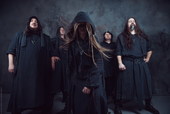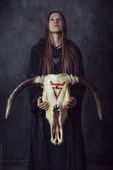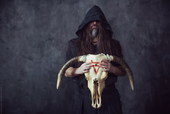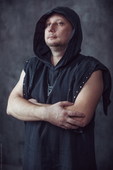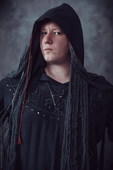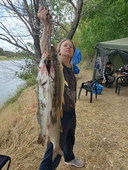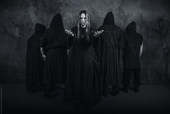Аркона
If the Fire of Life and Enlightenment Still Burns in Your Eyes
21.09.2023
Архив интервью | Русская версияWhen talent bestowed from above is reinforced by hard work, diligence, unbending willpower, constant mind broadening and increasing professionalism, the world gets treated to “Kob’”, one of the year’s most outstanding releases according to fans and critics. Arkona's new, ninth album is a well-thought-out monolith, a katabasis, where black metal aura has totally replaced perky folk themes. “Kob’” is a concept album both in artwork and in contents, where the six main tracks (bookended by an intro and an outro) symbolizing six stages of humanity’s immersion into the abyss of its own destruction, sound gloomy and hopeless, yet holistic, skillful and extremely melodic at the same time.
It’s been more than 1.5 years since we last talked with Masha “Scream” Arkhipova, the sole author and creator of Arkona’s music and lyrics albums. This time we discussed “Kob’” and its release show, the influence of cinema and the shooting of the band’s own videos, ancient rituals and the true Creator, the good and evil, the past and the present, and touched upon Masha’s philosophical worldview and the new era in her creative output.
Three months have passed since the release of “Kob’”, a very personal and hard-won album. Are you satisfied with the results of immense work that you’ve done, and with the listeners’ engagement and feedback?
Yes, after three months you can probably evaluate the listeners’ attitude properly. Based on the numerous opinions about the album, I can certainly say that I haven’t observed any negativity towards our new creation. Yes, perhaps the fans of the older works of ours remained indifferent to it, and there were some comments like “Arkona is not the same any longer”, but there were so few of them that I think it’s not worth focusing on that. Overall, the album has got very positive feedback, it attracted some listeners who weren’t familiar with our previous releases, or didn’t show much interest in them, but we’ve been noticing this trend for several years, since the release of "Khram" (2018), so we shouldn’t be surprised, we can only be glad that there are more and more devoted admirers of our work and they’re the people with a broad musical horizon, capable of understanding complex conceptual musical tapestries.
Do you perceive “Kob’”, your newest creation, as your favorite “offspring” or do you love all your albums equally, like children? How inevitable was the transition from a folky sound to a darker, black metal sound, in your opinion?
I believe that for any creator, the latest creation is always the most loved one, this is an indisputable fact, because it reflects the creator’s current views and emotions, the things he or she is going through and breathing at the moment. This is, in essence, a fresh perception of reality, without looking back at the past, although the past is the parent of the present, without our past we would not have what we have now. The path to the present has been long and thorny for all of us, but exactly because of that, step by step, we have come to living in awareness as we do now. We should be grateful to our past, honor it and love it just as much as we love our present, therefore I still love and respect our old albums. I’ve always done everything wholeheartedly, I’ve done what I considered necessary, with pure feelings and emotions that haunted me at that moment. And the pure and sincere creativity will always be valued and loved, regardless of any current factors that are making an influence on you.
Yes, probably this transition can be called inevitable, but it happened on its own, as a kind of more in-depth development in the current direction. I recently read a very detailed review of our album written for metal-observer.com by Dmitry Popov, an iconic figure in the Russian underground, and he points out that there have always been echoes of black metal in our works, but they were overshadowed by folk melodies that prevailed over heavy riffs and they were simply lost in rich arrangements. But these black metal elements have always been there, there’s no denying it, it’s just that they have gotten to play the dominating role in the musical component, and therefore are perceived as they should be perceived, no more, no less.
In a recent interview, your husband and guitarist Sergei said that “Kob’” reflected all the negativity and disappointment in people that you had accumulated in your soul in recent years. Has it ever happened that you crossed the line of utter despair, and what helped you most in those moments - an outpouring of creativity, or help and support of the loved ones?
All sorts of things have happened. In this four-year period, we have dealt with many things, from family issues to a global world upheaval and the loss of close ones, combined with an equally comprehensive upheaval within our band. I had to rethink and transform, decide on further actions and radically change a lot. For me it was a major emotional stress, and sometimes it went to extremes, I don’t deny that, as everything has its limit, but the main thing is to step over it, to survive and allow ourselves to move on unbroken, with a strengthened spirit and a new inner flame that we are willing to bear on our new path where we strive for new achievements. As long as we are alive, the energy that we carry in our creativity will be alive, and this energy can also support those who are, just like us, going through these indescribably difficult times.
Of course, everything that had accumulated in my soul during that time eventually found its release on “Kob’”, shaping its concept and describing the whole picture of today’s existence. For me it was a kind of liberation from oppressive thoughts, the release of my inner demons who help me create what I create. Of course, the support of close friends meant a lot too; it was they who encouraged me to take further action, in particular, to continue playing live. When you see that you and your creativity are still important to someone, it contributes greatly to recovery, and you regain your strength to move on, which is exactly what happened. And I am very grateful to them for that.
Everyone who’s bought the CD and especially the vinyl has been in praise of the magnificent cover artwork by Rotten Fantom depicting different stages of life, as well as of their illustrations for each song. Did you give the artists complete freedom of expression while listening to the album? What did you personally like most about the layout, what would you especially like to draw attention to, what details might be misunderstood or go unnoticed?
This time our cooperation was all-encompassing and more painstaking, we worked together on every detail in the booklet layout, despite the fact that the guys drew the cover themselves, based on their own associations that they got from the music and lyrics of the album. Personally, I’m a big fan of everything drawn by Rotten Fantom, without any exception, so it's very difficult for me to choose any particular aspects of my favorite artists' work. I perceive all of their artwork as holistic and multifaceted, they display a bunch of worlds, mythologies of different cultures, and all of that is presented in philosophical gloomy colors. These are Creators with a capital C, you can’t say that there is something in their work that you like more, and something that you like less, it is always different and multileveled, and I’m in love with their work because of this package.
As for hidden meanings in the booklet content, I would like to mention a couple of things: there is no randomness in the artwork. Even the smallest, barely noticeable details are directly related to the album concept, they are directly linked to the songs. Each page of the booklet belongs to a particular song and gives them comprehensive visual treatment, that is, the entire concept of lyrical content is skillfully displayed on the paper canvas in the form of minor details that resonate with each other and create a graphic structure of the content that is intertwined with philosophy and cosmogony with reference to the connection between the human and the divine. In the booklet you can see engravings by Robert Fludd, a 16th century Gnostic philosopher. Each of his engravings refers to a specific song and directly symbolizes its lyrical content.
There is one more thing I’d like to mention about skulls: they constitute a kind of triangle and symbolize three worlds (one lower, two upper), moreover, they are also encircled by an inscription in Sanskrit consisting of six words, each briefly describing a respective song, mirroring its soul. All of that is placed against the background of one of Fludd’s engravings, which refers to the connection with the divine principle (primordial cosmic energy), and this entire picture symbolizes the descent into Hell (the return to the original state, complete resetting).
In general, there is a lot to talk about, but I don’t think that we’ll fit into the framework of this interview, so let everything else be left to guesswork. In the end, there are so many levels in the artwork, let everyone see what they see fit.
All Arkona albums are projections of your thoughts and feelings, the embodiment of certain concepts. “Kob’” turned out to be dark and apocalyptic - was that your perception of reality at the time of creating the album? The theme of human atrocities is predominant on it, but given that Arkona still represents pagan metal, what role is assigned to religion and the Creator who is casually mentioned on the album? Is he horrified by the deeds of mankind, or does he just not care, what do you think?
In my philosophy, the Creator is nothing else but the primordial energy (Majestic Darkness), which was the creator of Light (creation), who eventually blinded his child (man) and plunged him back into Darkness (the primordial state). My views incline to the theory of philosopher Robert Fludd, who says that dark energy and light energy are essentially two sides of the integral whole that cycle in a circle, creating their own timeline and prevailing one over the other in different periods of time. It’s possible that after the complete extermination of humanity, life will manifest itself in a new guise, it might be some new mind in another incarnation, perhaps something else, but we will never know this, because all of us as individuals live this life only once.
The Creator you mention has nothing to do with the above. He appears in the song as a false Creator who has fooled people with religion and pseudo-beliefs, which, in turn, don’t give any hope for salvation, they can only dazzle and kill.
I’d also like to ask you about your impression from Konstantin Lopushansky's movies, "Dead Man’s Letters" and "A Visitor to a Museum", and his phrase "For You are a Man, and Nature has not seen anything more terrible than you ...". Why did these views and philosophy turn out so close to you, and how did you (for the first time, right?) decide to use something from cinematography in your music?
In general, in the very beginning of writing music, I had no idea what exactly the album would be like in conceptual terms, the chain was built link by link, and for all those five years there were things happening around me that had an impact on “Kob”’s final concept. The final realization came when I wrote the lyrics for the last track of the album, “Razryvaya plot' ot bezyskhodnosti bytiya” (“Tearing the Flesh Owing to the Despair of Being”), after watching Konstantin Lopushansky’s trilogy.
These movies struck me to the core, since they perfectly described my views on what was happening around me, they resonated with my soul and settled there, I think, for the rest of my life. In cinema, like in music, I rarely find masterpieces, but in this case the extremely talented director simply gave me no choice. The meaning, lines, phrases, colors, acting... All of this was in sync with my vision of the world, and the director’s philosophy completely echoed my own. There is no other way I can perceive the movies that were close to me in spirit. So it was natural that they had a profound impact on the concept of the album.
By the way, it definitely wasn’t the first time when we used movie samples, we already had such an experience, for example, on the "Vo Slavu Velikim! " album, where the song "Rus’ Iznachalnaya" is preceded by a sample from the movie of the same title. In addition, we have used a lot of different screams, battle sounds, footsteps, etc., sampled from other movies. This time we restricted ourselves only to phrases from the aforementioned Lopushansky’s trilogy, because each of them absolutely accurately described the concept of each of the songs on the album.
A question about “Ydi”, a ritual composition intended for accompanying the deceased to the next world, full of Norwegian black metal vibes, chants, vocabulary from pagan funeral rites and a character called “sukhoderets”, who is known only from an old Russian riddle. Can you clarify who this sukhoderets is (all of spiritually dead humanity maybe?), and also tell us how it happened that guitarist Thanatos got involved in the recording of the album?
This song has several levels and can be interpreted as you like. In general, its concept is a burial, a sort of final prayer over the dead body that, first and foremost, as you correctly noted, represents the spiritually dead humanity. Actually, suhoderets is an old name for a corpse, a dead man, and in some Russian hinterlands it was also the term for a suicider. Actually, the rite itself, which is described in the song with the words "Get into a pothole, crawl up an oak tree", is essentially ancient ritual games that used to follow a funeral. It was believed that the higher a person participating in these games climbs an oak tree, the higher the soul of the deceased person will rise after death. Overall, any information about such sacred acts, rituals or ancient rites is hard to find anywhere, because they were either forgotten or eradicated with the advent of Christianity, but for the most part all those acts were simply mixed with new practices introduced to us by Christian teachings. That is why we can mainly observe echoes of such rites in the description of church rituals, and when I come across something similar, I try to filter such moments out and keep for myself the most suitable topics that fit my vision. That's exactly what happened with this song.
I got introduced to Art (aka A. Thanatos) by Sergei at a live show of Art’s own band Thanatomass, although we had already known each other by correspondence for a long time. In fact, this interesting cooperation resulted from many coincidences. The foundation was laid when a mutual friend of ours, Oleg Olemus (of the Ritual Booking agency), decided to leave Russia and go to live in Kazakhstan, but before doing so, he organized a farewell concert, where Thanatomass played, and this is where Art and I got to meet each other. While we were talking in the dressing room, Olemus suddenly looked at Art and me, made a short pause, and, obviously joking, said, “Come on, it’s high time the two of you play together?” Of course, no one took this seriously, we just laughed and continued talking and drinking alcohol, but after seeing off Olemus “on his final journey,” his words stuck in my head. Then I totally forgot about it and only remembered it when we were discussing something, and Art said, “Why don’t you invite someone to play a solo?” That’s when Olemus’s words came back to my head abruptly, and then I invited Art to participate. This is how our collaboration came to life.
“Kob’” presents six stages of immersion into the abyss of hell and touches upon the most global issues of humanity, such as universal evil, diseases, wars, environmental disasters, nuclear threats, etc. As for me, I find the topic of environmental disasters very personal, so the video for “Ugasaya” deserves a separate question. You shot the video in a very short time; tell us briefly how this happened and whether you managed to avoid creative disagreements. And you might laugh, but some folks didn’t believe that the skull and the skeleton were real, “they’re too white,” they said... Can you explain what kind of animal it was, how you got it and why you decided to use it on stage. in photo shoots, and on the set of this video?
While deciding which songs we should shoot a video for and whether it was necessary at all, Sergei and I were inclined to do two videos, for “Kob” and “Razryvaya plot' ot bezyskhodnosti bytiya”. The “Kob” video was pretty much my own creation, from writing the script to developing characters and so on. Of course, it wouldn’t have been possible without the help of Sergei Shubin and his film crew, who brought this whole thing to life. When it came to mapping out the filming of “Razryvaya plot' ot bezyskhodnosti bytiya”, Sergei and I had some creative disagreements, mainly about the location of filming, budgeting and the use of footage from Lopushansky’s movies, which, in my mind, just had to complement the visuals. Sergei was strictly against this, and we argued for a long time about all other things related to filming, so, not being able to reach a consensus, we gave up this idea. However, the shooting of the second video had already been discussed with Napalm Records, they had already included it in their album promotion schedule, so we had to provide them with the promised promo item anyway. Thus, Sergei and I came to a compromise, choosing the song “Ugasaya” for filming. But while we were arguing and resolving all these complex issues with our previous plans, a lot of time was wasted, which is why the filming was carried out in an extremely short time. And if the video for “Kob’” was entirely my creation, the video for “Ugasaya” was implemented fully by Sergei. Disagreements can always be resolved, in our case, of course, with great difficulty and hassle, because we have different views, and some of our desires are just not possible to realize, but that’s what teamwork is: you need to be able to take into account the opinions of the people you work with, especially since Sergei’s creative views aren’t bad at all and also have the right to existence.
The "Ugasaya" video features a stand of bones, while all the skulls were given a prominent role in the video for "Kob’". And yes, all the bones that have been used in our videos are real, there is no place for fake stuff in what we do. We don't play with toys, we go for a different kind of creativity. There is no parody or theatricals in what we do, everything that happens here is happening for real.
All the visual stuff for the “Kob’” video was provided by Art Thanatos, the man who played the cosmic solo on the song “Ydi”. He lent me two human skulls, ritual cloth, black candles and a bunch of other little things. And the drummer of Thanatomass, Vladimir Muchnov, gave me the skulls of two goats that date back to the 9th or 12th century; they had been dug up and presented to him by some archaeologist. Actually, all the concert props of Thanatomass are present in our video, that was a funny collaboration we ended up with. I am incredibly grateful to the guys for their help.
The other couple of cow skulls belong to me. The crucial buffalo skull, which we always have on stage when we play, was bought in Europe at some festival where Arkona played about 15 years ago. It has traveled the world with us and it’s the key feature in our shows. The second cow skull comes from the same cow whose bones are on the microphone stand that you can see in the "Ugasaya" video. I found these bones, along with the skull, in our village cemetery while visiting my ancestors’ grave. They were left next to a cemetery dump and remained there for several years. Actually, for some years in a row I was walking by and looking at them, but I just couldn’t bring myself to take them with me... Finally, I made up my mind, took a potato sack, picked up the bones, carried them through the forest to my land plot and boiled them in a special disinfectant bleaching solution. Then our Vladimir (Reshetnikov, folk instruments) assembled them on a special frame according to my pattern, and this frame was placed on my microphone stand. I really hope that he will eventually complete it, and our ritual bull will retire with tambourines, while this bone stand will excellently replace it and sort of usher in a new era for Arkona.
I’d like to remind you about enthusiasts from Voronezh, who shot a video for the song “Serbia” in 2014. Seeing post-war devastation and a woman who had lost all her loved ones made such a big impression on you during your Balkan tour in 2010 and, as time can tell, the horrors of war are an ongoing issue even without a specific political context. “Kob’” as such leaves the listener with a feeling of anxiety and melancholy, so if we talk about wars, I would like you to share that story about that Serbian fan with a bullet scar under his heart that you saw at a concert/ I think it deserves to be heard, and it can add a bit of positivity. After all, music is what unites fraternal and distant peoples, isn’t it?
Wars are an integral part of our universe, it’s a separate branch of human existence, it would be impossible to imagine the circle of life or everything that exists on this earth without them. It’s the opposite of creation and it also makes a certain contribution to the cyclical-canonical essence of our existence. Yes, war means suffering, war means pain, war is an outburst of hatred and greed, but at the same time war means protection of one’s property and personal integrity. There is no peace without war. And this is again the same double-edged sword that I’ve already talked about. War must be honored in the same way as peace, like death and birth; by respecting and honoring the function of war, you gain understanding and awareness of the overall world order so you can involuntarily accept the essence of what’s happening as a result. But of course, the grief and loss that you feel in the same involuntarily way in the process of observing and surviving wars are accumulated in your soul and can be really depressive, especially for highly sensitive people like myself.
This story about a bullet next to the former Serbian soldier’s heart isn’t positive at all; it’s rather a negative echo of his tough fate which he couldn’t avoid, and those memories will remain with him for the rest of his life, even if not by his own will, in the form of a scar on his chest. This man was a fan of Arkona, he attended our concert in Serbia, he stood in the front row with his T-shirt off and his torso naked, so his bullet wound was clearly visible. I recall that during the song “Rus’” he was crying. After our performance, he threw his T-shirt at us and left. Perhaps even then he knew and felt much more than we do now.
Do you miss live performances and what did you enjoy about the Bylinny Bereg festival outside Moscow this year? Was it the largest round dance in the history of the band or any special gifts from the fans (like that axe)? Do you have a collection of gifts from different cities and countries, are those memories heart-warming?
I wouldn’t say that I really miss live performances so much; I had no desire to play concerts at all until recently, but so it happened that the situation has changed and now there is no turning back. Bylinny Bereg was especially massive this year, the round dance was excellent, of course, the people did their best, and their support was crazy. Of course, I remember the axe, a super gift! Apart from bones, I'm also a fan of any cold weapon, so the axe surprised and pleased me greatly, it was absolutely masterfully made, and I even tried it out while chopping off cabbages in my village. It’s a very cool thing, it cuts the way it should! In general, I have a large collection of gifts, my country house looks like a museum of diverse exhibits of world cultures. I constantly receive gifts, they might be jewelry, home decorations, clothes, weapons, masks, paintings, or portraits. I keep them all, every little thing that a person has put his or her soul into, made himself or ordered from someone specifically for us has its own secret place in my house. I never throw anything away; everything is hung on the walls or kept on the shelves specially designed for this purpose. And, of course, every gift reminds me about a particular city, concert, or tour.
I know that you go to see other bands (Thanatomass or SS-18 for example) live once in a while. What interests you more, is it black metal or anything else?
I hardly ever attend gigs, I only go if a band I love or am interested in is playing. I don’t go out for the sake of partying, it’s not my thing. There are very few bands in Russia that I really like. Thanatomass have been my latest discovery, they are the band I really respect, and I try not to miss their gigs. SS-18 was a good musical discovery for me as well, I became interested and went to see them live. They turned out to be a good live band playing solid black metal, no shit or opportunism, so I liked them. It's hard to say who will be next, it can be anything, but for now I'm just checking out new releases and keeping an eye on the national music scene, that’s it. Maybe in the future I there will be something else that I will get to enjoy.
Masha, you were recently spotted at a Brandy Kills concert, where you were discussing synthpop with people involved in organizing Moscow Dark Fest (a gothic- and electro-oriented urban festival – ed.). Why is there such an interest in electronic music, if it’s not a secret, and how can it affect your art?
Yes, Brandy Kills is another newcomer that I really liked. Igor Shapransky is a generally very talented young man, both Srub and Brandy Kills are some of the strongest musical projects in their genres. I enjoy attending his shows whenever possible, Igor and I are also good friends, it’s a pleasure to discuss various topics with him.
Generally speaking, I’ve never been indifferent to electronic music; back in my childhood days, at the age of 13, when I visited the light show of Jean Michel Jarre I promised myself do something musically similar to him. This is my primary reference point, perhaps for some future side projects, which I still plan to bring to life someday. Synthpop is no exception, I find it most important to listen to various bands in similar genres nowadays; I have recently discovered a very interesting band, Schonwald from Italy. They label themselves as darkwave or postpunk, but in fact they do very diverse music with some synthpop elements. As for postpunk, I also liked Drab Majesty, that’s my latest discovery.
I’ve also got to know that you did a guest appearance on a Srub abum – could you please say a few words about your collaboration with Igor Shapransky? What other artists would you like to collaborate with outside Arkona?
Yes, we have collaborated with Igor once, I appeared on his song “Ozhidanie Chernoi Vesny” (Black Spring Waiting) from the album “988” (2019). Igor wrote to me that he would like to hear my voice in his song, he sent me the material, and I did my vocals. In general, this album turned out to be very experimental, with elements of black metal, interesting collaborations and all sorts of other things. I highly recommend listening to it. This is not their typical album.
As to collaborating with someone, I am not so fond of these things. I cooperate with someone only in exceptional circumstances, if I really like the band, or the person is close to me spiritually. In all other cases, I turn down offers, which I get a lot from all kinds of bands.
I don't even know who I would like to collaborate with in the future, since I don't have any idols. Everything should happen by itself. If someone is close to me, then a collaboration will take place.
How do you spend your free time – is it gardening, fishing, parenting as usual or something else? After all the most terrible thoughts about humanity found their release on “Kob’”, how do you see the future of your children (hopefully in brighter colors)?
Yes, everything you mentioned above keeps me busy in my daily life. I try to spend my free time in the countryside, doing gardening or hiking in the forest. One-on-one interaction with nature is a very important and integral part of my life. Again, every year we try to go wild fishing with our family, we have our own place, not far from the village of Nikolskoye in the Astrakhan region, on Borisovka River, where we traditionally spend two weeks in August and return home with a huge catch, which we eat for a whole year until our next trip to that magical place.
As for my views on the future, everything depends on society as a whole, and how we will educate our next generation. So far I don’t see any factors indicating there will be any positive changes in the future, and as a mother of two children I am certainly afraid to look into the eyes of harsh reality, which shows us only its black, skinless face. I'm not a mentalist, and I can't say exactly what kind of future awaits us, but I describe the vision that I have as of today, reveal my views and concerns, and we'll see if they come true or not. I won’t call myself a prophet, this would be a very brave statement, however, based on my feelings, I expect my vision to come true. In fact, my thoughts on this matter are clearly spelled out on the new album.
I believe that we must live for today and educate our children according to our views and feelings, without looking at what is happening around us and what society is trying to use in its violent actions against a healthy and pure mind. If the fire of life and enlightenment still burns in your eyes, make sure it is bestowed on your descendants, and they will carry it to the end of their days with pride, a pure heart and their own beliefs. In the end, none of us is eternal, but we must do everything possible for our descendants so they can become our majestic and sincere followers, because they are the continuation of ourselves.
How are you getting ready for a three-hour concert – the “Kob’” release show in Moscow? Apart from rehearsals, how do you prepare yourself physically and mentally? Have you ever performed when you felt really sick? Did your fortitude help you cope with it? After all, you give your best on stage, plunging into a special state of mind…
Preparations are in full swing, it’s going to be a really large-scale event, as always, we are playing a three-hour set with songs from different eras of our discography. We will traditionally devote the first part to the presentation of our new album, and in the second and third parts we will please our listeners with songs from older albums. We are planning to install additional lighting equipment, we will also try to have a proper stage set, I am currently thinking about all these details, so we are preparing both physically and mentally, we are rehearsing diligently and looking forward to meeting you all.
Of course, I’ve had to perform when I wasn’t feeling well, on more than one occasion. For example, I can recall nearly passing out on stage during a South American tour. It was incredibly hot in the club, 40 degrees Celsius, and my body simply could not withstand such a load. We had to shorten the set and only played half of the planned songs. In other cases, I try to soldier on and make sure sicknesses don’t come into play, because a show always means responsibility, and we try to do everything possible to be in good health and give away a lot of energy and strength.
I can recall that 1.5 years ago concertgoers were only allowed to your gig at Moscow’s Urban upon presentation of a QR code (confirming that they have been vaccinated against COVID or received a negative PCR test – ed.), so not everyone got to see your show. What do you expect this time and is it true that you’re going to play the entire new album? Will the release show be filed for a live video?
Well, this time, of course, there will be no QR codes checked at the entrance, the only thing is that photographers will have to make a request to bring in any equipment; we have made a post on our VK page describing how it can be done. Yes, indeed, we will play the entire album, except for one song, “Na Zakate Bagrovogo Solntsa”, since there is a time limit and it simply doesn’t fit into the set list. All other songs will be played in exactly the same order as they appear on the album, with the intro, outro and all the samples that you can hear between the songs. We are in discussions about filming the show, it’s quite possible, because the show is going to be very interesting and we are unlikely to ever do it again.
On social networks I often see fans from other Russian cities asking, “When will Arkona play in our city, is a Russian tour possible?” Is there a chance for people living far from the capital to hear “Kob’” live, or is it better for them to come to the album release show if they have an opportunity?
It's better for them to come over here, because we don’t have any plans to play in other Russian cities, but time will tell, perhaps at some point in the not-so-near future we might be ready to do some selected cities. But definitely not at the moment so we will be very happy to see everyone from remote places at our album release show in Moscow.
To wrap up this interview, what wise and kind thoughts would you like to share with your listeners, maybe recommend some music, and not only music?
Just be yourself and follow your own path, without looking at the society and this whole mass anthill that swarms on the pile of its own corpses, without even knowing it. And, of course, I recommend listening to “Kob’”, Arkona’s new album, if anyone hasn’t heard it yet. Also I’d like to remind you that we’re finally going on a European tour in support of “Kob’” (and more tours are to be announced), so keep your flame burning! We’ll see you on the threshold of the abyss!
Arkona on the web: http://www.arkona-russia.com/
Interview and translation into English by KNfromSU
Photos courtesy of Maria Arkhipova
September 20, 2023
© HeadBanger.ru
